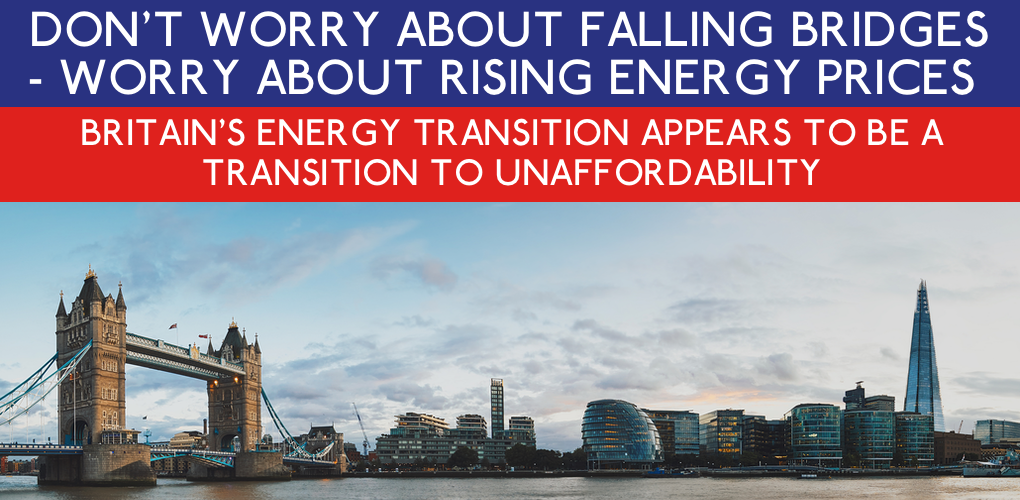
The Real Energy Story in the U.K.
From the tone of the coverage announcing that the U.K. has gone more than 10 days without generating any electricity using coal, one would think Britain had singlehandedly turned the tide against rising global emissions. Renewable boosters and climate hawks have fallen over themselves in praise of this “accomplishment.” But what this fawning coverage has missed is that the U.K.’s energy transition is coming with crushing, regressive costs.
As one column in the Financial Times put it, “Britain’s high electricity prices risk a ‘gilets jaunes’ backlash.” The writer is, of course, referring to the infamous yellow vest protests that have at times paralyzed France.
Despite energy use in Britain dropping by eight percent since 2010 and per-project renewable energy costs falling as well, energy prices and energy bills continue an unabated march upwards. Even with muscular intervention in energy markets to protect consumers, Britain’s energy regulator is continually having to raise the cap on the dual-fuel bill (electricity and natural gas) charged to the nation’s most vulnerable customers. In fact, the bill jumped 10 percent earlier this year. It has risen by nearly 30 percent since late 2016.
Driving the increase appears to be the hidden policy costs of supporting decarbonization efforts. Integrating large amounts of renewables onto the grid is costly. These hidden policy costs now amount to about 20 percent of electricity costs for a capped dual-fuel bill and have nearly doubled since 2015. They’re expected to continue to rise as more low-carbon capacity is forced onto the grid in place of lower cost coal and natural gas generation.
These rising prices may well be palatable for the well-off who are happy to virtue signal with solar panels on their roofs and a new Tesla in the driveway, but rising energy prices are taking an ever-larger chunk of the disposable income of those who can least afford it. Make no mistake, these decarbonization policies are regressive. It’s just a matter of time before Brits find some yellow vests of their own.
Higher Electricity Prices Everywhere
Defenders of the cost of decarbonization efforts in Britain will happily tell you that electricity prices there are still but a fraction of those on the continent. That may be true, but that says very little about the merits of Britain’s efforts and far more about just how shockingly costly renewable energy promotion has been in Denmark, Germany and other neighboring countries.
Der Spiegel magazine reported that Germany has spent 160 billion euros on its energy transition over the past five years and has achieved puzzlingly little. Consumers have been forced to pay 50 percent more for electricity and what have they gotten? Renewable generation may be up, but Germany is far from meeting its emissions targets. Germany’s Federal Court of Auditors has reported that these expenditures “are in extreme disproportion to the results.”
Europe is no outlier. Pushing renewables onto the grid is ratcheting up electricity prices everywhere. Just a few weeks ago, researchers at the University of Chicago released a comprehensive study that concluded renewable portfolio standards are driving up electricity prices in the U.S. They found that consumers in the 29 states with renewable portfolio standards paid $125.2 billion more for electricity in the seven years after these policies were enacted than they would have otherwise. Sense a trend?
The evidence is rather clear: forcing ever-growing amounts of renewable power onto the grid drives up power bills. This forced march to unaffordability is precisely what American consumers tell us they don’t want. Recall that in a recent poll conducted by Morning Consult, Americans were asked if they would like to transition to a renewables-based grid as quickly as possible or would prefer to take measured steps that account for affordability and reliability. Just 25 percent of Americans responded that they want a fast transition to renewables. Fifty-six percent of Americans want a more measured approach – affordability and reliability matter.
Time and again, voters here and abroad tell us they are concerned about energy costs. Yet, costs continue to mount. Britain’s energy transition appears to be a transition to unaffordability. That’s the real story, one American policymakers should not ignore.
- On May 29, 2019
